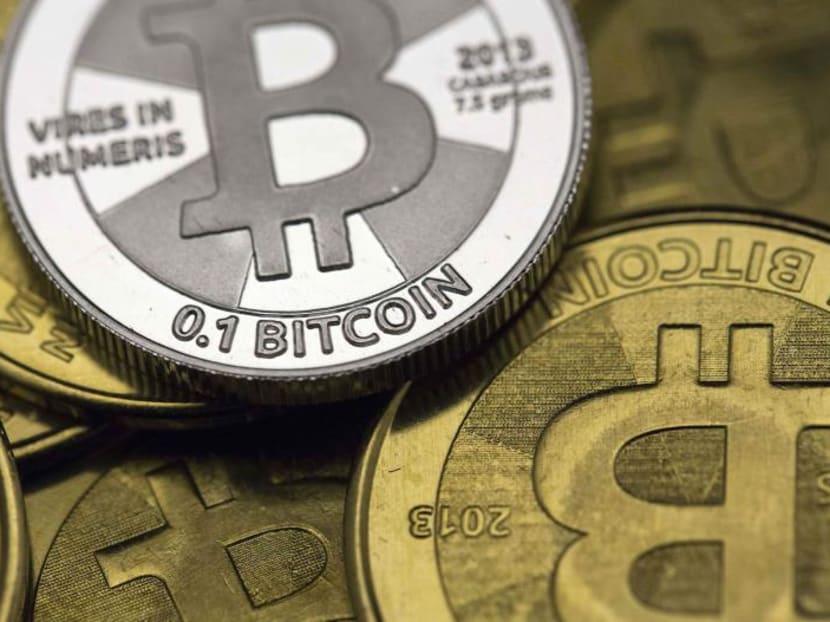Two sides to Bitcoin investment
Boom. Bust. Boom. Bust. If you want volatility, cryptocurrencies such as Bitcoin deliver it daily.

Bitcoins or other cryptocurrencies are available on online exchanges or even at ATMs, similar to buying other foreign currencies.
Boom. Bust. Boom. Bust. If you want volatility, cryptocurrencies such as Bitcoin deliver it daily.
The critical question for investors, though, is whether cryptocurrencies are a worthwhile investment or almost pure speculation.
Cryptocurrencies are digital currencies that use algorithms and cryptography to generate units and to verify transfers of funds.
While cryptocurrencies are more often bought for investment, some of them can also be used to pay friends or to buy things such as pizza or travel.
However, as Time magazine noted, cryptocurrencies exist in an unregulated, decentralised digital sphere without involvement by or protection via central banks, such as the Monetary Authority of Singapore (MAS).
Bitcoin, created in 2009, is the oldest and most widely used cryptocurrency. Since then, a variety of other cryptocurrencies have emerged, including Ripple and Ethereum.
Separately, hundreds of companies have started issuing their own “coins” over the past year or so in Initial Coin Offerings (ICOs), to raise funds without turning to traditional venture capital firms.
Many of the more than 1,000 cryptocurrency coins that now exist can, however, usually be used only to make purchases from the companies that issued them.
BUYING CRYPTOCURRENCIES
You can buy Bitcoins or other cryptocurrencies directly from online exchanges or even at ATMs, similar to buying other foreign currencies.
The key difference is that cryptocurrencies are entirely digital.
Exchanges or brokers where you can trade Bitcoins include Coinbase, Exodus and Bitstamp.
Just like you need a wallet to hold paper money, so will you need a wallet to hold digital currency. You can create a wallet by registering at an exchange and downloading one.
The wallet stores your private key, which can give you access to your Bitcoins on almost any exchange.
Software wallets are applications that you can download to a mobile phone or a laptop, while hardware wallets store your key on a secure device that looks like a USB drive.
Once you have a wallet, you can go to an exchange and buy the number of Bitcoins you want.
Since prices have been high recently, and since Bitcoins can be divided to up to eight decimal points, you can often buy less than one Bitcoin.
Depending on the exchange, you can buy Bitcoins with a credit card, bank transfer or even cash.
Once you have bought a Bitcoin, it stays in your digital wallet until you use it for a purchase or sell it.
SIFTING THROUGH VARIED VIEWS
Views on investing in Bitcoin vary tremendously, with advocates saying the only long-term trend is up and opponents calling cryptocurrencies speculation or worse.
Late last year, for instance, MAS said that it “advises the public to act with extreme caution and understand the significant risks they take on if they choose to invest in cryptocurrencies. Investors in cryptocurrencies should be aware that they run the risk of losing all their capital.”
A report from news agency CNN was similarly cautious, saying the chance of seeing a big payout from buying Bitcoin “is almost lottery ticket-like”.
The Guardian newspaper was even more blunt: “So you’re thinking about investing in Bitcoin? Don’t. The reason why is that it’s not an investment.”
JP Morgan Chase Bank’s chief executive officer Jamie Dimon famously called Bitcoin a fraud.
Then, there are others who are optimistic, having seen Bitcoin begin 2017 at a price of about US$1,000 per coin and end the year at more than US$19,000 (about S$25,000).
Software pioneer John McAfee is among the most positive, forecasting that Bitcoin will rise to US$1 million by 2020.
Julian Hosp, co-founder of a company called TenX that makes Bitcoins spendable, forecasts a high of more than US$50,000 after a fall that could take Bitcoin below US$5,000.
And Saxo Bank, which correctly predicted a massive rise in Bitcoin prices last year, forecasts that “Bitcoin peaks in 2018 with Bitcoin above $60,000” before it “crashes and limps into 2019 close to its fundamental ‘production cost’ of US$1,000”.
PREPARE TO BE SURPRISED
Putting some perspective on these varying views as well as the ups and downs, Boston University lecturer Mark Williams said: “(Bitcoin) has proven to have resiliency and an ability to bounce back. In 2013, it peaked at US$1,200, experienced a mini-crash, dropping to US$200 by 2014, and remained below this high for three years before hitting new hyper-highs in 2017. Bitcoin continued to surprise many sceptics, including myself.”
Other observers focus on other cryptocurrencies. Forbes contributor Panos Mourdoukoutas, for example, said that Ripple could be the next Bitcoin and soar from its current level.
As Singapore’s Deputy Prime Minister Tharman Shanmugaratnam summarised it in Parliament in February, cryptocurrencies are “an experiment”. “People are trading in them in the hope of making a profit. It is too early to say if they will succeed. We will keep highlighting to Singaporeans that they could lose their shirts when they invest money in cryptocurrencies,” he said.
While there is clearly the potential to make money by buying Bitcoins or other cryptocurrencies, it’s also possible to lose plenty.
For anyone considering buying Bitcoin, Mark Williams has prescient advice: “Do your homework first, understand your personal risk tolerance, and if interested, commit only an amount of money that you are willing to lose. For risk-adverse investors, stick with traditional stock and bond investing.”
CORRECTION: In an earlier version of the story, we wrongly stated the name of TenX co-founder as John Hosp. It should be Julian Hosp. We are sorry for the error.






